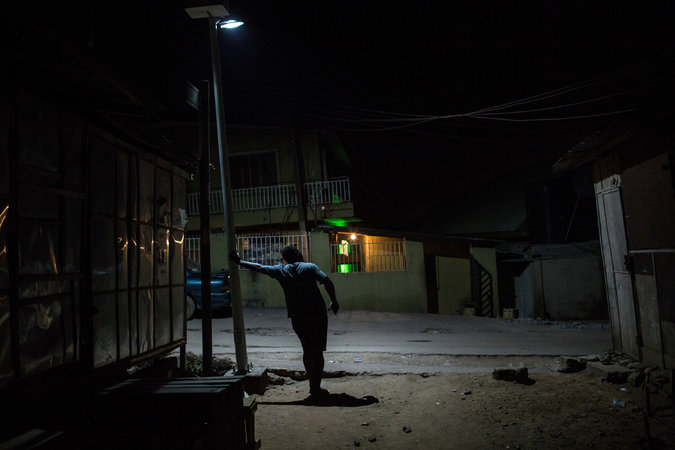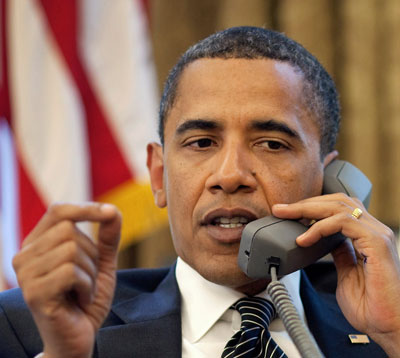Nigerian activists protest harmful, flawed N.Y. Times coverage
Colin Stewart is a 45-year journalism veteran living in Southern…
Nigerian LGBTI rights activists have challenged the accuracy of the Dec. 20 New York Times article titled “U.S. Support of Gay Rights in Africa May Have Done More Harm Than Good.”
Complaints about the article have included:
- The unauthorized use of a photo of an activist (since removed), which put the person’s life at risk;
- The unsupported and wildly inaccurate claim that the U.S. has “put more than $700 million into supporting gay rights groups and causes globally.”
-

President Barack Obama (Photo courtesy of Wikimedia Commons) The claim that Nigeria’s anti-gay movement is a response to U.S. adoption of LGBT rights as an important focus. The focus was adopted only during the second term of President Obama (2013-present), while the backlash is more accurately described as beginning with the Anglican Communion’s Lambeth Conference of 2008 or earlier, when the Anglican Church of Nigeria protested the 2003 acceptance of openly gay Bishop Gene Robinson by the U.S. Episcopal Church.
- Lack of emphasis on the U.S. role in encouraging positive developments in Uganda and Malawi, as mentioned in this blog’s Dec. 20 article on the New York Times report.
The article has done great harm to African activists’ struggles for recognition of the human rights of LGBTI Africans, activists say, because it provides ammunition for anti-LGBTI forces to use in claiming that LGBTI rights are a foreign import, funded massively by the United States.
This is the statement from the Coalition for the Defense of Sexual Rights — Nigeria:
Statement on the backdrop of New York Times article on US Support for LGBT Rights in Nigeria
The Coalition for the Defense of Sexual Rights (CDSR), an umbrella body of organizations working to secure the human rights of all Nigerians, inclusive of LGBT rights is alarmed at the recent article published by New York Times alleging that US supports for LGBT rights in Nigeria may have done more harm than good. CDSR dissociates itself from the article and condemned it for its lack of journalistic rigour.
First reaction to the article was what was the aim of the author of the article?
There are questionable assertions in the article and we are taken aback that some people say the support they receive from the US or the West has backfired on advocacy. CDSR stance on such statements is that it lacks rigour. Also quoting a community member who does not understand the process of advocacy or the relationship that advocates have with the US and other western nations is a slap to the journalism that produce the article. Also the statement credited to a leading member of CDSR and an early pioneer of LGBT activism in Nigeria, Ms. Dorothy Aken’Ova is misleading.

We categorically state that US and other western nations support for LGBT rights in Nigeria has actually brought our issues to the front burner of politics and policy making. In fact to a large extent, it has contributed to the visibility that we enjoy as a community and using that visibility to strengthen our advocacy. What has been challenging in the past was the tactics employed in the past by the West in speaking first without local consultations. This was especially after the comments of Prime Minister David Cameron on cutting aid to nations that had or were proposing discriminatory laws and policies regarding sexual orientation. The policy has since changed in that local activists are consulted first before any decision is adopted by the West, especially the US. Key members of CDSR are a testament to that. Recently, the US Deputy Assistant Secretary, Bureau of Democracy, Human Rights and Labour, Steven Feldstein was in Lagos and met with activists. His key question was how should the US react?
CDSR welcomes the removal of USAID logo from documents of its partner organizations as it seeks to counter the cultural imperialism rhetoric that is being used by the right wing. However, the removal of the logo or not from these documents or office spaces does not in its entirety backfire on advocacy. This is because the conversation and advocacy to shift the rhetoric of cultural imperialism is a call of local activists and organizations working to promote human rights on grounds of sexual orientation and gender identity for Nigerians. It is our call and we are constantly in discussion with each other on how to turn the table around. We must be able to challenge the hypocrisy of singling out LGBT rights out of all the humanitarian work that the US or other western nations fund.

And the issue of human rights violations has always been there before the advent of the anti-gay law. It won’t go away anytime sooner, US efforts or not. We state categorically that the anti-gay law caused a shift in human rights violation but to heap that blame on US support for LGBT rights in Nigeria lacks merit. We must remember that we had a government and system in place that was eager to use minorities’ lives as a politicking campaign and agenda.
And the case of police stopping and searching people on grounds of their perceived sexual orientation, there are plans to address the issues and raise them in the local media. Not raising this issue on the home front, especially in the media but then raising it on international media only contributes to the cultural imperialism that the article was referring to.
As the title of the anti-gay law in Nigeria was carefully worded to win the hearts and minds of Nigerians, the title of the article and its contents dance to the tune of our oppressors. Coming out in public to quote figures that the US support LGBT rights with is at the detriment of frontline activists, advocacy and our community members. It is in line with the notion that homosexuality is a western import. Caution must not be thrown to the wind especially as to how much the US or other western nation funds LGBT rights within media spaces. CDSR believes that such statements are for internal circulation as part of financial accountability of donor agencies.
CDSR is also alarmed that the article failed to mention the promotion of hate and the support of criminalization of homosexuality by the World Congress of Families but was quick in quoting an outrageous amount in US support of LGBT rights. CDSR expects that as a global media house, New York Times will balance its stories, cross-check facts and use its platform to call out against hate groups.
In correction of the misleading information as contained in the article, CDSR urges the New York Times to reproduce a more balance and unbiased article, and when seeking information on LGBT rights advocacy to speak with known frontline activists.
Finally, CDSR continues to count on the support its receives from the west and other donor agencies in ensuring that human rights for all Nigerian citizens becomes a reality without exclusion of any group.
Signed:
Coalition for the Defense of Sexual Rights
This article was revised on Dec. 25 to correct a misstatement about which activist’s photo was removed by the New York Times.
Related articles
- Human rights defenders urge respect for LGBTI Africans (76crimes.com)
- Goal: Boost safety, effectiveness of LGBTI rights defenders (76crimes.com)
- African Commission backs LGBT rights (76crimes.com)
- Tortured in Gambia: LGBTI people, journalists, activists, clergy (76crimes.com)
- UNHCHR alarmed at LGBT arrests, detentions in Gambia (76crimes.com)




Reblogged this on Fairy JerBear's Queer/Trans News, Views & More From The City Different – Santa Fe, NM and commented:
Pushback from Nigerian activists in response to the New York Times article blaming the West for worsening the plight of LGBTQI communities in Africa.